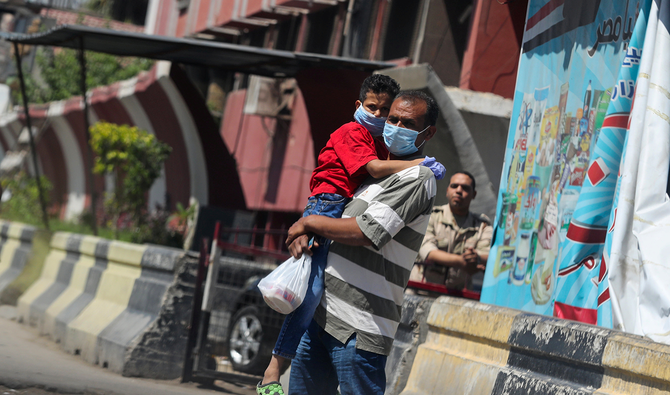CAIRO: An Egyptian doctor has caused controversy over the number of coronavirus cases in the country by saying the real numbers may be up to 10 times higher than the reported figures.
Dr. Adel Khattab, a member of the Higher Committee for Viruses affiliated with the Ministry of Higher Education, made these remarks in an interview with Egyptian Minister of Higher Education and Scientific Research Khaled Abdel-Ghaffar.
Khattab said COVID-19 cases in Egypt could hit 40,000 in just a few days. The Egyptian Health Ministry figures say that, as of Friday, the number of confirmed cases was 22,082 with 879 deaths.
Khattab said the number of infections recorded daily only reflected the cases reported to authorities. He said there were many patients with mild symptoms who went untested for the virus and, therefore, were unregistered.
He said the actual number of cases was expected to reach 10 times the number of reported cases, mainly due to socializing during the Eid Al-Fitr holidays.
The increase in cases would be prevalent among those who returned to the provinces for the holiday, then left for work and the disease would mostly be spread through people who have contracted the virus without showing symptoms, also known as silent carriers or asymptomatic.
Khattab explained that the danger lay with people who were asymptomatic.
Abdel-Majid Ibrahim, a doctor at a quarantine hospital in Egypt, said that Khattab was drawing on foreign research. A German-conducted study showed that one out of every five infected people failed to show any symptoms and therefore became a silent carrier of the virus, which could infect four out of five individuals, he explained.
“The daily numbers shared by the Ministry of Health may be based on speculation,” he told Arab News. “There are no numbers or figures other than those announced by the ministry — 1,200 daily cases reported on Friday, May 29, making the total cases reported in the country over 22,000.”
The government has begun paving the way for “coexisting with coronavirus” including imposing a fine of EGP4,000 ($235) on anyone out in public or a private crowded place not wearing a facemask. People will not be permitted to enter any facility, government-owned or otherwise, without wearing masks. The same applies to public and private transport. Malls and shops will be allowed to reopen all week, starting from Saturday.
Several Egyptian officials have said the country must end its lockdown soon and people must resume work to prevent the economy from collapsing.
Egyptian Minister of Religious Endowments Mohamed Mokhtar Gomaa announced that a plan to reopen places of worship was ready. Mosques and churches in Egypt have been closed and religious rituals have been suspended since March.
Gomaa said the plan would be presented to a coronavirus crisis management committee headed by the prime minister next week.
The Egyptian president’s advisor on health and prevention, Dr. Mohamed Awad Taj El-Din, predicted that coronavirus infections in the country would reach their peak in two weeks.
He called for all of the country’s institutions to work together “to survive the crisis safely.”













